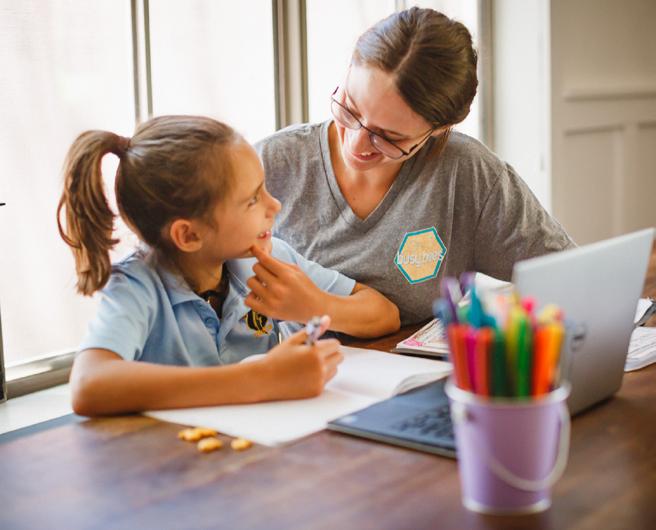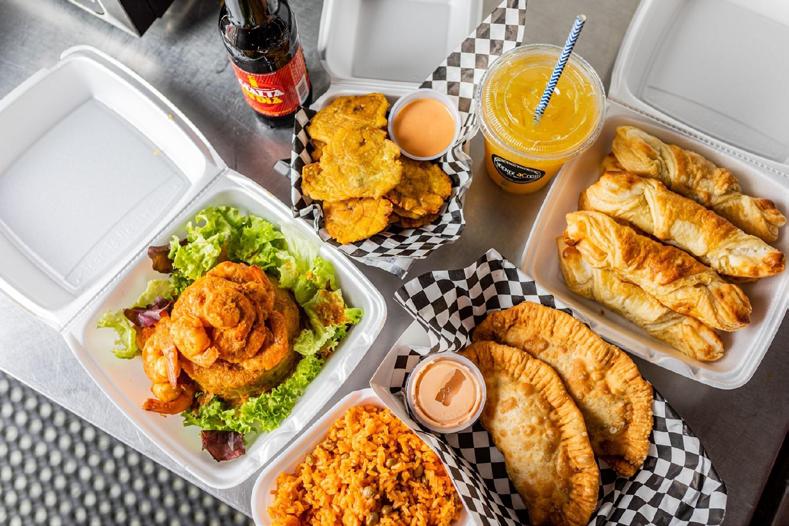
9 minute read
Entrepreneur spotlight
Aural Analytics

Visar Berisha and Julie Liss are professors in ASU’s Ira A. Fulton Schools of Engineering and College of Health Solutions. Their research has made national headlines in recent years for its potential to transform early diagnosis of neurological conditions such as Alzheimer’s disease. Through their analysis of former U.S. President Ronald Reagan’s public speeches, made over the course of his time in office, Berisha and Liss were able to demonstrate the ways in which subtle changes in speaking patterns may predict neurological problems far more quickly than current clinical methods can.
Groundbreaking as this research may be, there are limits. Not every individual has a trove of information as vast as a U.S. president. Or do we?
By some estimates, people spend an average of four hours a day on their smartphones, and these devices capture valuable data about human behavior, including movement patterns, communication markers and even changes in facial expression. Berisha and Liss believe this information could have an incredible impact on neurological research. With the help of the Edson E+I Venture Devils program and former Venture Mentor Daniel Jones, who serves as CEO, they have set out to prove it. Aural Analytics launched in 2015 with the goal of developing a technology capable of analyzing everyday interactions on your phone, email or social media, and using it to examine neurological health.
Proprietary metrics capture subtle changes in speech through a simple app installed on your phone or tablet and use them to monitor brain function. Aural Analytics’ suite of mobile-first, patient-centric applications — available in up to 30 languages across Android, iOS and the web — are easy to use and secure. They provide robust, clinically relevant, interpretable and validated metrics reflecting the neurological and respiratory health of users.
Aural Analytics has successfully raised $5.3 million in equity funding, secured nearly $2 million in grant funding from the NSF and NIH, and grown its commercial footprint with the successful launches of its Speech Vitals and A2E software products. The team of 23 full-time and part-time employees will launch several pivotal studies in 2021 to further demonstrate the safety and efficacy of its software suite and is currently pursuing multiple 510(k)s with the FDA.
Tropical Almond

Freda Sarfo, a master’s degree student in global logistics and a MasterCard Foundation Scholar, won a total of $9,000 at Demo Day competitions for her venture, Tropical Almond. Sarfo started her business in her kitchen, formulating products made from tropical almonds found on ornamental trees in her native Ghana. One out of seven Ghanaian children dies of malnutrition, and women have few job opportunities to support their families. Sarfo established her social enterprise to curtail both societal issues.
Sarfo learned that the fruit of tropical almonds contains a high-quality cosmetic oil, more protein than chicken and more fiber than oats. Sourcing from local communities, due to the lack of tropical almond farms in Ghana, Sarfo employs about 60 women, mostly single mothers, who collect and crack fallen nuts, assisting them during the pandemic, as many lost other forms of employment. The oil is sold as a hair product for Black women, and the nut by-product is processed into a nutritional snack.
“Through our outreach program, where we educate people on the benefits of the trees, we have been able to prevent more than 1,000 trees from being cut down,” noted Sarfo. In addition, for every bottle of almond oil sold via their online store, the company donates a bag of high-protein snacks to hungry children. She hopes to eventually start a tropical almond orchard in Ghana to produce a reliable source for the oil and create more jobs.
Busy Bees Babysitting

The COVID-19 pandemic has upended daily life, with more people than ever working and schooling their children from home. The need is great for resources and tools to ease the burden of conflicting responsibilities. So when ASU alumni and past Venture Devil participants Amanda Belinger and Katrina Brumm had to temporarily shut down in-home bookings for their popular business, Busy Bees Babysitting — a platform that connects thousands of Phoenix and Tucson families with babysitters known as “bees” — they knew they had to find some way to keep helping families in need.
Enter the Homework Hive — a service through the Busy Bees website where tutors and specialists walk children through lessons remotely. The service matches parents with specialized homework helpers, including those experienced in working with children with special needs and those who are fluent in languages other than English.
In addition to providing families with much-needed help, the service has ensured income for many teachers seeking additional work and other professionals who would otherwise be unemployed.
Alexia Carter-Salomon is a special education teacher in Phoenix who worked as a Busy Bee to earn extra money for three years, thanks to the flexible schedule.
“When Busy Bees stopped going into homes and turned to remote learning, I was like, ‘Oh perfect! I’m already doing that with my own students,’” said Carter-Salomon, who earned her bachelor’s and master’s degrees in education from ASU.
She uses the lesson plans from the kids’ schools or her own curriculum, and she said parents are grateful for the academic help.
“A lot of parents feel like their kids have missed so many learning opportunities, and it’s refreshing to get a teacher teaching their kids for two hours,” she said.
Even as restrictions are easing and Busy Bees has returned to in-home babysitting, Homework Hive has remained active. Belinger and Brumm expect to keep it running well into the future. “A lot of moms mention to us that even if everything returns to normal, if they can have someone walk their 7-year-old through homework, they would love that,” she said.
Phoenix Coqui

When Alexis Carbajal and Juan Ayala moved from Puerto Rico to Phoenix, they quickly noticed something was missing — 100% authentic Puerto Rican food. They decided they could fill that need by starting their own food business.
Carbajal is an ASU graduate with a background working with local startups and entrepreneurs. Ayala has an MBA in business management and human resources from Universidad Metropolitana in Puerto Rico, along with a passion for food.
“Juan was amazed that the fifth largest city in the U.S. did not have very many options when it came to Caribbean cuisine. Initially we thought we would need a fusion (Mexican and Puerto Rican) to entice people to try something new and out of their comfort zone,” said Carbajal.
Once they established their goal of authentic Puerto Rican food, they had to start navigating all the details that go into a food business, starting with raising capital. While it took two years of savings to reach their startup goal, they still needed guidance and mentoring on how best to proceed. When Carbajal and Ayala heard about Edson E+I’s Prepped program for food entrepreneurs through Local First Arizona, they knew they found what they were looking for.
“Our favorite part of Prepped was connecting with other local entrepreneurs and experts in the industry that served as mentors for us. The biggest takeaway was that once we gained the knowledge to structure our business, our confidence to bring our business to life far exceeded our fear. It helped us tremendously not just to launch, but to launch on the right foot, and in our opinion, it has been the reason for our accelerated growth,” said Carbajal.
Now as proud Prepped alumni, Carbajal and Ayala would not hesitate to describe the program’s contributions as life-changing. “Small businesses are the backbone of our communities and our economy, and we felt extremely privileged to have been granted the opportunity to incorporate ourselves into the fabric of our community.”
Better Family Products

Jenavi Kasper is a Peoria resident, a mother of two young children and founder of Better Family Products, a venture that provides products and services designed to improve the physical and mental health of babies, kids and parents. Like many entrepreneurs, she has a hectic schedule, and she sometimes struggles to find the funds to keep her business running smoothly.
Kasper joined Venture Devils after participating in a wayfinding meeting with Edson E+I’s Peoria Forward program. Through Venture Devils, she connected with a team of experienced mentors to refine her business plan, execute market research and access the Peoria MET to 3D print a prototype.
This spring, Kasper’s hard work paid off when she won $5,000 in seed funding and $5,000 worth of product design consulting through the Venture Devils Demo Day. Her award was the largest amount provided to date through the Retail Devils Powered by Follett funding track. The fund began as a pathway for student entrepreneurs to get their creations into the Sun Devil Bookstore and has since expanded.
Celebrating her success on Instagram, Kasper wrote, “I have a hard time calling attention to myself or celebrating my success publicly. I fight to achieve as much as I can because I want to fulfill my potential…[and] I’m proud of myself for doing it now and proud I won. I’m even more excited that my company will bring innovative solutions to the market that will truly make life easier and healthier for parents and kids!”
telëveda

Shruti Gurudanti founded telëveda to address loneliness among seniors. One of her loved ones suffered from Alzheimer’s disease before passing away, and she knew firsthand the role that social isolation played in the illness.
“Accessibility is one of the most important problems of our times,” Gurudanti said. “I can’t stand to see more people affected by something that is easily preventable.”
With support from Venture Devils and Peoria Forward, Gurudanti and co-founder Mayank Mishra launched telëveda to design solutions that alleviate social isolation. Through its core Empowered Living Program, the company works with senior care organizations to keep seniors engaged in everyday life through livestreamed wellness classes and games and other technology-enabled offerings.
Demand for telëveda’s programs was already high, but Gurudanti says the pandemic added pressure on nursing home staff, who often lacked options for preventing social isolation while keeping residents safe. In the span of a month, telëveda doubled its revenue as its customer base expanded in response to the need.
In June 2020, telëveda won a $50,000 award in the Greater Phoenix Tech Challenge in recognition of its efforts to address the COVID-19 pandemic — a grant that Gurudanti said will help increase customer support while potentially creating opportunities for expansion.










